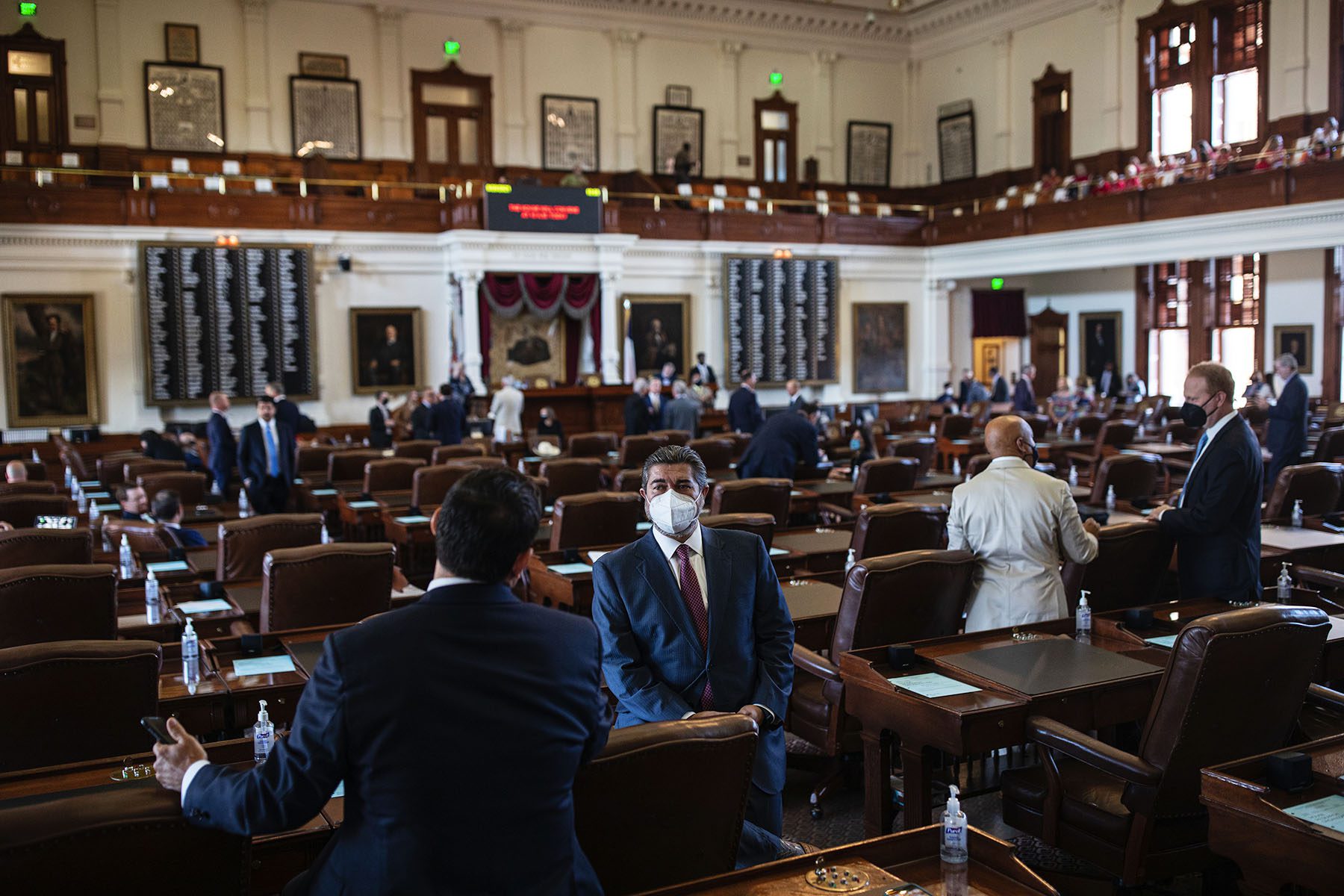Amber Joiner was just a few years into a political career as a lawmaker in Nevada when she announced she would not seek reelection.
Joiner, a Democrat, simply could not afford to serve in the legislature. Her take-home pay while she was in office between 2014 and 2018 was roughly $11,000 annually after taxes. She estimates she was actually losing about $2,000 a year as an elected official because her health insurance premiums, which included coverage for her two children, cost more than her paychecks.
Though Nevada is unique in that women outnumber men in its part-time legislature, data shows that America’s statehouses are still predominantly made up of White men. When Joiner struggled to find an employer who would accommodate her unpredictable hours at the Capitol, she realized that the work of policymaking had been designed for people who are retired, independently wealthy or without kids.
“There’s very few of us who are able to have a family, make enough money, and have health insurance for them through a second job, and then not kill ourselves trying to do a good job,” she said.
A report released Monday by New American Leaders on low salaries in statehouses highlights the financial realities for policymakers such as Joiner, and the ways that pay impacts who is able to run and stay in office. But the political backlash in raising salaries for lawmakers also carries pitfalls.
The report analyzed salaries in several legislatures around the country and concluded that most lawmakers are paid wages that do not allow them to focus solely on the job of legislating. Many work in legislatures that are considered hybrid or part-time. They meet for shorter periods of time, often at the beginning of the year and into the spring. But it’s a role that has morphed in recent years into one with increasing year-round demands and expectations from constituents, many of whom may not realize their lawmakers are being paid little to no money to be that accessible.
Lawmakers who spoke with The 19th said they didn’t go into the statehouse to make money. But they also don’t want to be put in a situation where they have to struggle financially just to do their jobs.
Moira Jayne Walsh made so little money when she was elected to serve in the Rhode Island statehouse in 2016, the Democrat briefly continued shifts serving at a restaurant on some mornings and weekends after she was sworn in. She said her bi-weekly paychecks were about $500 after taxes. (Lawmakers made an annual salary of a little under $16,000 during the time she was in office.) She borrowed money from family and friends and incurred credit card debt to make it all work while she lived with her young son and three adult roommates.
Walsh said her pay qualified her for government assistance, but she did not sign up because she worried about the political reaction. She lost reelection in a September 2020 primary.
“I felt like committing myself to the community was important enough that I was willing to make the financial sacrifice, but it was obviously something that wasn’t sustainable,” she told The 19th. “And it was obviously something that I couldn’t have done for the length of time that a lot of these other representatives do — some people have been up there 15, 20 years, and I really could only afford four.”
She said she’s just getting out of what she described as “the poverty that life in the statehouse put me into.”
“Not only are you asking women — particularly working women, women of color — to sacrifice their time and their sanity to dedicate themselves to the communities that they care about, you’re also asking them to sacrifice their bottom line. And there are some people who will do it anyway, knowing that it matters and it’s important. But it shouldn’t have to be.”
A separate review by the National Conference of State Legislatures estimates the average base salary among 41 states that pay their legislators an annual salary is $39,216.
It’s a total that has actually decreased over 30 years when considering inflation. In 1970, lawmakers made an inflation-adjusted average of $43,521, according to NCSL.
There are wildly different standards for a state lawmaker’s salary. California, Michigan, New York and Pennsylvania are the only full-time legislatures with robust staffing and compensation that does not require lawmakers to have a second source of income, according to the New American Leaders report, which analyzed statehouse pay in several areas of the country. Lawmakers in California make $114,877 a year, the highest total of any statehouse, followed by New York ($110,000 annually) and Pennsylvania ($90,335 annually). Each state has separate rules for per diems, or expenses for travel and lodging.
On the other end of the spectrum are statehouses like New Hampshire, where lawmakers receive $100 annually and are in session every year for roughly six months. It’s the same salary that they’ve received since 1889. That’s technically less take-home pay than in New Mexico, where lawmakers receive no salary for their work but get a reimbursement stipend for travel and food.
The low pay effectively creates barriers to more diverse representation and trickles down to what kind of policy is created, said Ghida Dagher, president of New American Leaders, which recruits and trains first- and second-generation Americans to run for office. It estimates that just 3.5 percent of America’s 7,383 state legislative seats are held by new Americans. Women make up just 31 percent of statehouse seats, and 26.6 percent of that figure are women of color.
“State legislators have this enormous power to decide the future of immigrants, BIPOC communities and just constituents at large,” said Dagher. “But due to low legislative salaries, many people who are most impacted by the policies that legislators make are shut out of positions of power.”
In Georgia, where lawmakers this year debated restrictive voting bills, lawmakers are paid a little over $17,000 a year plus a per diem. Republicans in control of the legislature led an effort last year to cut that pay due to a reduced budget tied to the pandemic, arguing that the public had also faced hardship.
For Sam Park, a Democratic lawmaker in the Georgia House who was elected in 2016, his pay in recent years has roughly translated to about $1,100 a month over a 12-month period, and another $500 a week for travel and food while lawmakers are in session for about three months out of the year. When he’s not in session, Park is still devoting anywhere from 10 to 20 hours a week to being a lawmaker on top of a full-time job as an attorney.
“Due to low legislative salaries, many people who are most impacted by the policies that legislators make are shut out of positions of power.”
Ghida Dagher, president of New American Leaders
“You have to really prioritize your time, and it takes away from your ability to fully engage and commit to serving your community in terms of providing services, in terms of doing the research necessary to introduce legislation that would help your constituents,” he said. “It ends up becoming a juggling act.”
Part of the root issue is that most lawmakers have to give themselves a pay raise — and in some cases send it to voters. In 2014, voters in Arizona overwhelmingly defeated a referendum to increase lawmakers’ annual salary from $24,000 to $35,000. Opponents of the pay raise at the time said part-time work did not necessarily merit higher pay.
The issue has bipartisan support in some instances. This year, lawmakers in the Republican-controlled legislature agreed to raise the reimbursement budget for rural lawmakers who must stay overnight in the capital city during session, noting their $60 daily stipend had not changed in 30 years.
Dagher said the potential political blowback to increasing pay does not offset the reality, which is that as long as statehouses are financially out of reach as jobs for everyday people, they will not reflect the needs of a demographically diverse population.
“Any time there is discussion of tax dollars and people’s dollars being used toward a salary, there is some frustration,” Dagher said. “But the reality is, this is a full-time job. Community and constituent needs are year-round, they’re not part-time. So our legislatures should be set up at a full-time basis to really serve the needs of their communities.”
The New American Leaders’ report has several recommendations, including that lawmakers switch their statehouses to full time. While several have fixed end dates during session, lawmakers sometimes go weeks or months over those allotted times. Some rely on special sessions to meet later into the year. The report highlights research that shows statehouses that meet longer and pay higher salaries pass more bills, including per legislative day.
The report also recommends that lawmakers create independent compensation committees or commissions that can review potential pay increases. Nineteen states are known to have such bodies to either study lawmakers’ salaries or set it, which could reduce public backlash and build trust. The report also recommends that lawmakers expand their ability to use campaign funds to pay for child care, an option that depends on where a candidate lives in the country. It also suggests that lawmakers invest more in candidate recruitment efforts.
Other recommendations note that lawmakers should offer better pay to people who work as staff for lawmakers. Joiner in Nevada was given no budget to hire personnel staff. The Nevada legislature is considered part-time, with lawmakers in session for roughly four months during odd-numbered years — about 120 days in a two-year period. (Individual Nevada legislators’ pay can vary slightly depending on where.) But the work of researching and crafting policy — proposals due before the start of sessions — stretched into other parts of the year and were her sole responsibility.
So Joiner was in charge of the individual outreach she received from constituents. Every day, Joiner was contacted via email, text or phone by people, organizers and interest groups with questions, concerns and requests to meet.
Joiner said some colleagues privately suggested that she ignore parts of the job that involved being available to constituents. But that was why she wanted the job in the first place. In her early 40s at the time, Joiner had been appointed to her seat in 2014 to fill a vacancy. She was elected to a two-year term in 2016. She had high hopes for the work. She would try to answer emails in the early morning hours, after everyone in her family was in bed.
“I was physically making myself sick. All those years, I was getting three hours of sleep a night, four hours of sleep a night. You can’t answer emails until 1 a.m. and then turn around and wake up at 5 a.m. It’s not sustainable,” she said.
Marie Pinkney, a Democratic senator in the Delaware Senate, considers herself one of the lucky ones. She earns $45,000 annually for her work in the part-time legislature, which meets about six months out of the year. She is a social worker at a hospital year-round, even while she’s in session.
Pinkney said she enjoys working outside of the legislature, an experience that she said helps shape what she advocates for in the statehouse. But she wishes she could work fewer hours at the hospital to better balance both responsibilities. Lawmakers meet three days days a week while in session, so Pinkney is able to work Mondays, Fridays and weekend shifts at the hospital.
Pinkney sometimes skips lunch to log into legislative meetings from the hospital cafeteria. She attended a bill signing a few weeks ago in her scrubs because she didn’t have time to go home and change.
Pinkney realized recently that she only had two days off in the month of October that did not involve either her job at the hospital or her work as an elected official. She said in a more ideal situation, she could log in fewer hours at the hospital and the legislature would offset that in pay.
“I’m 31 years old and I live on my own, so $45,000 a year is not much when you consider a mortgage payment. When you consider student loan debt — I’m $110,000 in student loan debt for becoming a social worker,” she said. “And it’s very interesting how our jobs, not just in Delaware, but in state legislatures across the country, are considered part time. But it’s really just part time on paper.”







